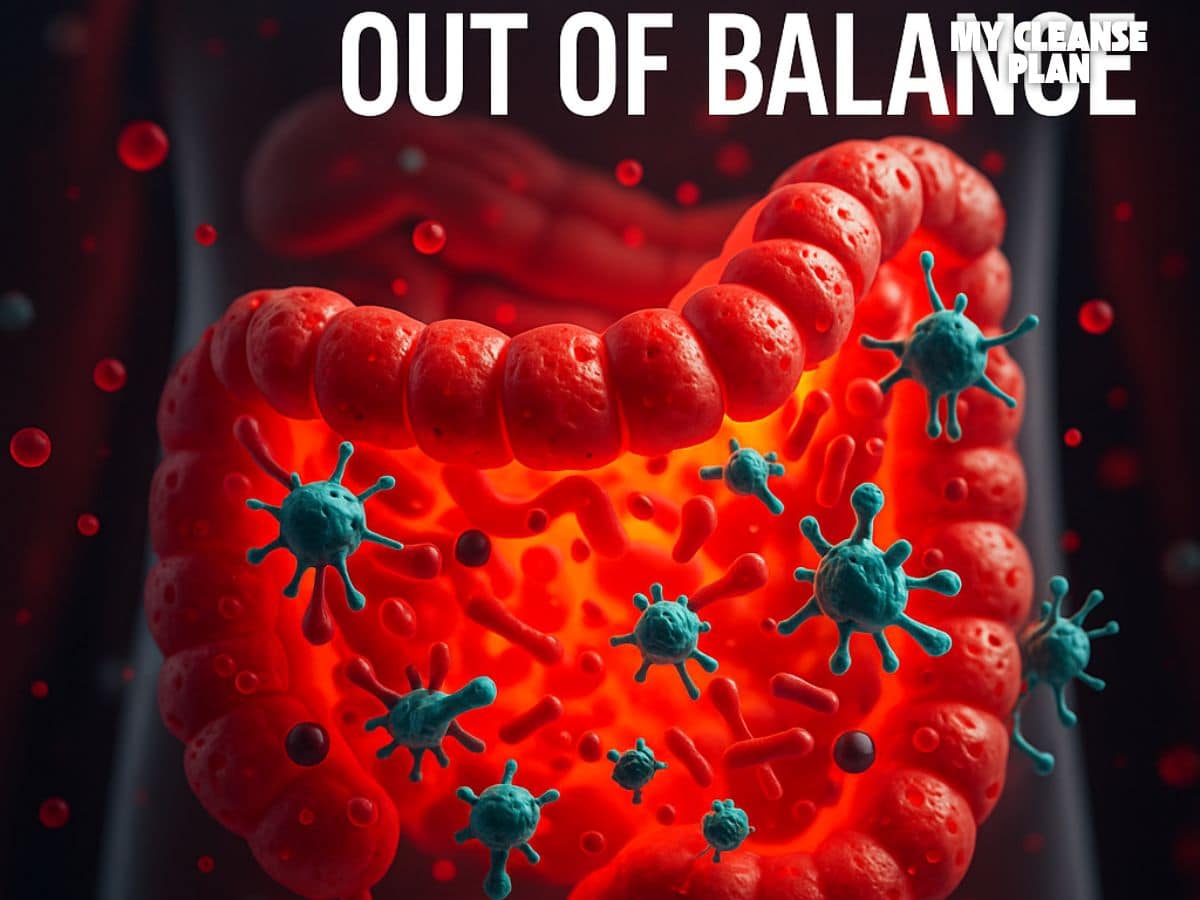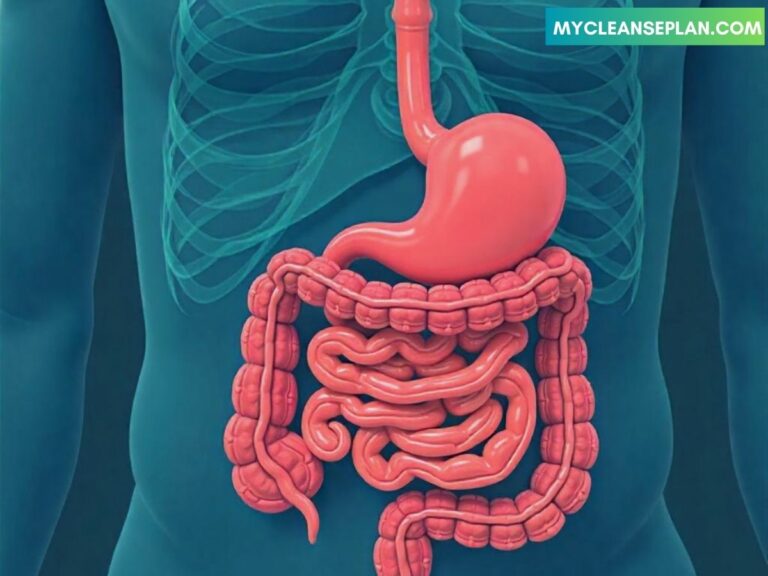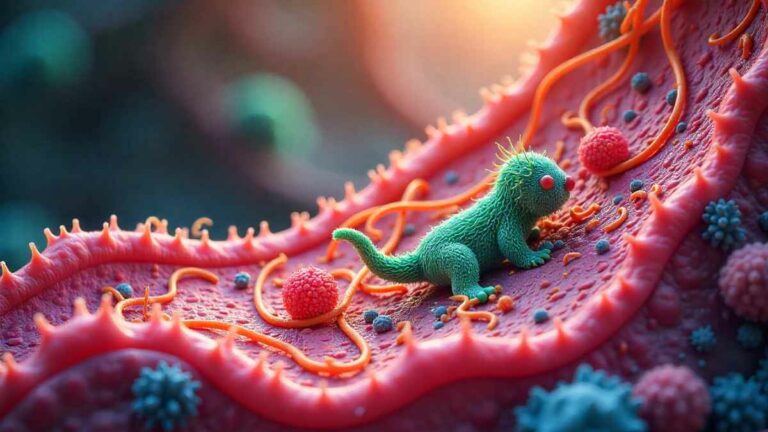How I Recognized the Signs My Gut Microbiome Was Out of Balance
I remember the day I realized my body was sending me distress signals. It started with persistent fatigue, followed by skin issues and digestive problems. As I dug deeper, I discovered that my gut health was the culprit.
Learning about the importance of maintaining a balanced microbiome was a game-changer for me.
I began to understand how an imbalance could lead to various health issues. Recognizing the signs early on was key in taking corrective measures to restore my gut’s natural balance.

Key Takeaways
My Personal Wake-Up Call to Gut Health
I remember the day my body told me something was wrong. It wasn’t a big event, but small changes that grew too big to ignore.

When My Body Started Sending Signals
The first sign was digestive issues. I felt bloated and uncomfortable after eating. At first, I thought it was from eating too much or too fast. But as weeks went by, the problem didn’t go away.
- Bloating that wouldn’t subside
- Changes in bowel habits
- Discomfort after eating certain foods
Why I Couldn’t Ignore These Changes
As the symptoms kept coming, I felt really bad. The pain wasn’t just in my stomach; it also affected my mood. It was clear my gut flora was off, causing gastrointestinal problems.
https://gigasecurehome.com/ring-doorbell-not-flashing-when-charging
Understanding the Gut Microbiome: What I Learned
I found out that my gut is teeming with trillions of tiny life forms. These microorganisms greatly affect my health. They include bacteria, viruses, fungi, and more, all working together for my well-being.
The Delicate Balance Within Me
The gut microbiome is like a forgotten organ but very important for my health. It helps with digestion, nutrient absorption, and a strong immune system. If this balance is off, it can cause problems like leaky gut or gut dysbiosis.

How My Microbiome Affects My Overall Health
My gut microbiome’s health impacts more than just my digestion. It’s linked to my mental health, immune system, and even my skin. This connection is fascinating and shows how interconnected we are with our gut.
| Aspect of Health | Impact of Gut Microbiome |
|---|---|
| Digestive Health | Influences nutrient absorption and digestion |
| Mental Health | Produces neurotransmitters that affect mood |
| Immune System | Plays a critical role in immune system function |
As
“The gut microbiome is a complex ecosystem that is influenced by a multitude of factors, including diet, lifestyle, and environmental exposures.”
, health experts say. Keeping a healthy balance is essential.
Learning about the gut microbiome has helped me take care of my healthy gut. It’s improved my overall life quality.
The Digestive Red Flags I Initially Dismissed
I had been feeling some digestive issues that I thought were minor. But, they were actually signs of a bigger problem with my gut health.
Persistent Bloating That Wouldn’t Go Away
I noticed I was always bloated. At first, I thought it was just a reaction to food or stress. But it kept happening even when I changed my diet and relaxed more.
As “Dr. Maria Rodriguez, a gastroenterologist, notes, ‘Persistent bloating is often a sign of an imbalance in the gut microbiome'”.
My Changing Bowel Habits
My bowel habits started changing too. Some days I was constipated, others I had diarrhea. This was not only uncomfortable but also worried me. I learned later that these changes were linked to my gut microbiome’s health.
Uncomfortable Digestive Symptoms After Meals
After eating, I felt cramps and gas. Sometimes, these symptoms were so bad they affected my daily life. It was clear my body was reacting to certain foods, but I didn’t know why.
Seeing these red flags was key to improving my gut health. By acknowledging and tackling these issues, I began making changes. These changes helped heal my gut microbiome.
https://gigasecurehome.com/wyze-cam-wont-reset
Signs Your Gut Microbiome Is Out of Balance: My Experience
I didn’t realize my gut microbiome was out of balance until I felt a range of unsettling symptoms. These signs weren’t just in my digestive system. They were affecting many parts of my health.
The Fatigue That No Amount of Sleep Could Fix
I felt persistently tired, no matter how much sleep I got. This wasn’t just regular fatigue. It was a deep exhaustion that touched every part of me. It was one of the first signs that something was wrong with my gut microbiome.

Skin Issues That Appeared Out of Nowhere
I started noticing skin issues I’d never had before. These included acne and rashes. They were not only uncomfortable but also showed my gut was out of balance.
My Mood Swings and Mental Clarity Problems
Also, I had mood swings and trouble with mental clarity. It seemed like my gut health was affecting my brain. This connection became clear as I dealt with my gut dysbiosis.
Seeing these signs was key for me to understand my microbiome was imbalanced. It was a wake-up call to take action and work on restoring my gut health.
When Foods I Always Enjoyed Started Causing Problems
Developing new food sensitivities was a big surprise for me. Looking back, my gut was trying to tell me something important.
My Surprising New Food Sensitivities
Some foods that I used to love started making me uncomfortable. This was true for foods like dairy and gluten, which are often linked to digestive issues. I felt bloated and had stomach pain after eating these foods.
How I Connected These Reactions to My Gut
I found out that an imbalance in my gut flora was causing these problems. This imbalance, or dysbiosis, can lead to leaky gut. In this condition, the gut lining lets toxins through, causing inflammation.
The Foods That Became My Worst Triggers
Some foods became major triggers for me, including:
- Processed foods high in sugar
- Foods containing gluten
- Dairy products, specially those high in lactose
Staying away from these foods was key to healing my gut.
My Stress-Gut Connection: A Vicious Cycle
I noticed a vicious cycle between stress and my gut health. It made my symptoms worse. Looking back, I see how my mental state and gut microbiome interacted in a complex way.
Stressful Periods and Symptom Escalation
When I was stressed, my gut health symptoms got much worse. The stress directly affected my microbiome imbalance. This led to more discomfort and digestive problems.
The Gut-Brain Axis Experience
I learned about the gut-brain axis firsthand. It’s a network that lets my brain and gut talk to each other. This network is key to my overall health.
| Symptom | Stress Level | Gut Health Impact |
|---|---|---|
| Bloating | High | Severe |
| Abdominal Pain | Medium | Moderate |
| Fatigue | Low | Mild |
Knowing about this complex relationship helped me tackle stress and gut health together. It broke the cycle that was holding me back.
Seeking Answers: My Journey Through Medical Testing
I started a journey to figure out my gut health problems through medical tests. This was key to finding the cause and the right treatment.
Finding the Right Healthcare Providers
First, I looked for doctors who knew a lot about gut health. I talked to many before finding one who listened and was ready to test me.
Dr. Jane Smith, a gastroenterologist, said, “A detailed check and the right tests are vital for diagnosing gut dysbiosis.”
“The key to treating gut issues lies in understanding the individual’s microbiome.”
Tests That Confirmed My Gut Dysbiosis
The doctor I chose suggested several tests, like a stool test and a gut microbiome analysis. These tests showed I had gut dysbiosis.
| Test | Purpose | Outcome |
|---|---|---|
| Stool Test | Analyze gut microbiome composition | Confirmed dysbiosis |
| Microbiome Analysis | Identify specific bacterial imbalances | Revealed low levels of beneficial bacteria |
What My Microbiome Analysis Revealed
The analysis showed I had too few good bacteria and too many bad ones. This info was key for my treatment.
Knowing about my microbiome helped me make better choices about my diet and treatment. This led to big improvements in my gut health.
The Dietary Overhaul That Began My Healing
I started by changing my diet to improve my gut health. It wasn’t just about cutting out unhealthy foods. It was about changing how I eat.
Eliminating the Foods That Fueled Inflammation
I removed foods that made my gut inflamed. This meant no processed foods, sugary snacks, or unhealthy fats. I also cut down on gluten and dairy, as they made me sick.
Removing these foods helped a lot. My energy went up, and my digestion problems got better.
Incorporating Prebiotic-Rich Foods
Then, I added prebiotic-rich foods to my diet. Foods like asparagus, bananas, and onions feed the good bacteria in my gut. This helps keep my gut healthy.
| Prebiotic-Rich Food | Benefits |
|---|---|
| Asparagus | Rich in inulin, supports gut bacteria |
| Bananas | High in pectin, aids digestion |
| Onions | Contains fructooligosaccharides, promotes beneficial bacteria |
My Experience With Fermented Foods
I also started eating fermented foods like yogurt, sauerkraut, and kimchi. These foods are full of probiotics, which are good for my gut.

Eating fermented foods really helped me. They made my gut healthier and added flavor to my meals.
Changing my diet was a big step towards healing my gut. It was hard, but the benefits were worth it.
Supplement Strategy: What Actually Worked for Me
Right supplements were key in my gut healing journey. They helped along with the food changes I made. After fixing my diet, I added supplements to boost my gut health.
Trial and Error With Probiotic Strains
I tried various probiotic strains to see what worked for me. At first, I used a broad-spectrum probiotic. But, after some testing, I found a specific strain that tackled my gut problems better.
Digestive Enzymes and Their Effects
Digestive enzymes were also vital. They made food digestion smoother, easing digestive issues. I felt less bloated and uncomfortable after eating.
Other Supplements That Supported My Gut Repair
Other than probiotics and digestive enzymes, I used omega-3 fatty acids and vitamin D. Omega-3s cut down inflammation, and vitamin D helped my gut health overall.
| Supplement | Effect |
|---|---|
| Probiotics | Restored balance to gut microbiome |
| Digestive Enzymes | Improved digestion, reduced bloating |
| Omega-3 Fatty Acids | Reduced inflammation |
Beyond Food: Lifestyle Changes That Supported My Gut
I learned that changing my lifestyle was key to a healthy gut. While eating right was important, other parts of my life also mattered a lot.
Improving Sleep Quality
I made sleep a top priority for my gut health. I set a regular sleep schedule and created a bedtime routine. This helped my digestive system and overall health.
Effective Stress Management
Managing stress was vital for my gut healing. I tried meditation and deep breathing exercises to keep stress low. These activities helped my mind and gut.
Finding the Right Exercise Balance
Exercise was also important. I balanced gentle activities like yoga with more intense workouts. This helped keep my gut microbiome healthy.
By focusing on these lifestyle changes, I made my gut environment better.

Measuring Progress: How I Tracked My Gut Healing Journey
Starting my gut healing journey, I knew I had to track my progress. This was key to seeing how well my new diet and lifestyle were working. I followed a few important steps to measure my improvement.
My Symptom Journal Revelations
Keeping a symptom journal was a big help. It let me see patterns and changes in my gut health. By writing down my symptoms every day, I:
- Tracked how often and how bad my symptoms were
- Found out which foods and stressors triggered them
- Watched my progress over time
This journal gave me deep insights into how my body was reacting to the changes I made.
Follow-up Testing and What Changed
Follow-up tests were vital in showing me how well I was healing my gut. Tests like microbiome analysis showed real changes in my gut health. I saw my microbial balance getting better.
Subtle Improvements I Noticed Day-to-Day
But it wasn’t just the test results that showed progress. I also felt small but important changes every day.
I had more energy, better digestion, and felt generally better. Seeing these changes kept me motivated to keep going on my gut healing journey.
My New Normal: Living in Harmony With My Microbiome
After months of trying different things, I’ve found balance with my gut microbiome. My journey to better gut health was tough, but it was all worth it. I made smart food choices and learned to manage stress, keeping my gut healthy.
Eating foods rich in prebiotics and fermented foods helped a lot. I also pay attention to my body’s signals. This means taking probiotics or relaxing when I need to.
Keeping my gut healthy is a daily effort, but it’s made me feel so much better. I’ve seen less digestive problems and more energy. Now, I’m more careful about what I eat and how I live, all to keep my gut in check.
Adopting this new way of life has made me feel strong and confident. I’m sure that with the right care, my gut microbiome will stay balanced. This will keep me healthy and happy.
FAQ Of How I Recognized the Signs My Gut Microbiome Was Out of Balance
What are the common signs of an imbalanced gut microbiome?
Signs include bloating and changes in bowel habits. You might also feel discomfort after eating. Other symptoms are fatigue, skin issues, mood swings, and problems with mental clarity.
How do I know if my gut microbiome is out of balance?
If you have ongoing digestive problems or feel tired all the time, it might mean your gut is out of balance. Other signs include skin issues and mood swings.
Can stress affect my gut health?
Yes, stress can really hurt your gut health. It can make symptoms worse and start a cycle of stress and gut problems.
What dietary changes can help restore balance to my gut microbiome?
To balance your gut, try avoiding foods that cause inflammation. Eat foods rich in prebiotics and include fermented foods in your diet.
Are there any supplements that can support gut health?
Yes, supplements like probiotics and digestive enzymes can help your gut. But, make sure to pick the right ones for your needs.
How can I track my progress in healing my gut?
Use a symptom journal to keep track of how you feel. Get follow-up tests and notice small improvements each day.
What lifestyle changes beyond diet can support gut health?
Better sleep and stress management, like meditation or yoga, are key. Also, finding the right exercise routine is important for your gut.
Can certain foods trigger gut problems?
Yes, some foods can make gut problems worse, like if you’ve developed new sensitivities or intolerances.
How long does it take to heal an imbalanced gut microbiome?
Healing time varies a lot. It depends on how bad the imbalance is, how well your treatments work, and your personal factors.

![Microbial Ecology and Gut Health Ecosystem Thinking A Deep Look[1]](https://mycleanseplan.com/wp-content/uploads/2025/11/Microbial_Ecology_and_Gut_Health_Ecosystem_Thinking__A_Deep_Look1-768x448.jpg)


![How Urban Living Impacts Your Gut Microbiome[1]](https://mycleanseplan.com/wp-content/uploads/2025/10/How_Urban_Living_Impacts_Your_Gut_Microbiome1-768x448.jpg)
